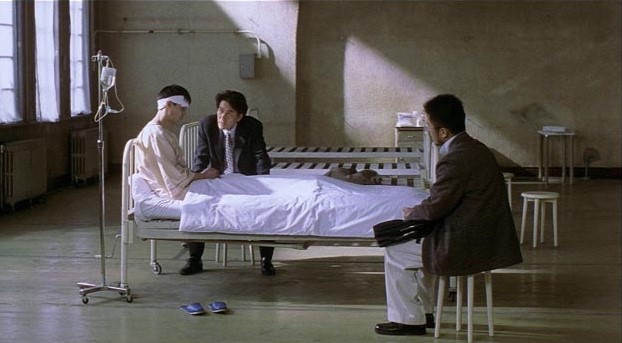Cure [Kyua]
1997

Rated: NR
Genre: Crime, Thriller, Horror
Country: Japan
Run-Time: 1h 51min
Director: Kiyoshi Kurosawa
Cast
Koji Yakusho……………….Kenichi Takabe
Masato Hagiwara……..Kunio Mamiya
Tsuyoshi Ujiki………………Makoto Sakuma
Anna Nakagawa………..Fumie Takabe
Kiyoshi Kurosawa’s Cure released a few years prior to the sudden international fascination with J-Horror. Though the film made waves in the festival circuit, its popularity would eventually get eclipsed by overtly supernatural horrors like Ringu, Ju-On: The Grudge and even Kirosawa’s prolific horror follow-up Pulse. And though I appreciate why many consider Pulse to be amongst of the greatest modern horror films of its generation, I personally feel that Cure, Kurosawa’s horrifying crime thriller, is his greatest masterpiece.
Cure is about Kenichi Takabe (Koji Yakusho) a detective investigating a bizarre set of murders. In each case, the murderers are found near the scene, and none seem to have an obvious motivation or a history of violence that might explain their actions. Equally concerning is that every victim has their throat slashed in the same X pattern, but the perpetrators do not have any clear connection to each other and the police have kept details of each crime hidden from the public.
Takabe is sure there is a mastermind orchestrating the crimes. When not avoiding his wife, who seems to suffer from the early stages of dementia, Takabe rubs ideas off his psychologist friend Sakuma (Tsuyoshi Ujiki). Then, one day, Takabe is able to push his investigation forward by seriously considering the possibility that all the murderers were actually unknowing victims of hypnosis.
There is no doubt that with Cure, Kurosawa is deliberately defiant in his cinematography, editing and storytelling. The film is shot and edited in an intentionally detached manner. (I am reminded a little of Let the Right One In.) We look at many long scenes but are not provided the usual cues that help us to interpret the information. The film is almost devoid a soundtrack and reaction shots are rare. The violence in the film is, at times, graphic, but also a certain sinister nonchalant-ness about it. The many long takes and distanced camera work forces us to think about what we are seeing. Kurosawa is not interested in holding the audience’s hand. Even using the common tropes of the thriller genre to help us make predictions does not provide much help, as Mamiya, our hypnotist killer, is such a stark subversion from the norm.
And as a serial-killing horror villain, Mamiya (Masato Hagiwara) is absolutely fascinating. As an actor, Hagiwara is not particularly handsome and he is not imposing as a figure, and that makes Mamiya’s inexplicable power over people all the more frightening. In fact, he looks exactly like the type of unassuming person you would let your guard down with. He is a completely original take on the archetypal serial-killing super genius that he could have descended into parody if Hagiwara had not played him with such menacing believability. At first, he presents himself as a vulnerable amnesia victim who also, like Takabe’s wife, suffers from short-term memory loss. Of course, this seems conveniently irritating for anyone trying to interrogate him, but he seems harmless enough. But asks a question, or else makes an impossible observation, and it becomes obvious he is (metaphorically speaking) a demon and his confusion has a method. Suddenly, he transforms into a predator who has patiently been toying with his prey.
But Kurosawa does not allow Cure to be completely overrun by its unique villain, as Yakusho’s protagonist, Detective Takabe, is an interesting case study in his own right. Takabe is a man who likes control and wants answers, but the situations he ends up in often deny him of both. At first, we see Takabe as a stoic man of the law, but as the film progresses, Takabe starts to release more of his inner aggression. His precarious hold on his emotions makes him ideal as a foil for the calm and manipulative Mamiya.
Those who have seen Pulse will recognize the trademark dream logic that is sprinkled throughout many of Kurosawa’s films. But in Cure it feels particularly well-suited since the core conflict involves interactions with mysterious master hypnotist. Many of the strange events that occur in the film are obvious illusion that can be explained by Mamiya’s suggestive powers. But some events, like the shaking table at the film’s beginning- which has seemingly no connection to Mamiya- can never be satisfactorily explained. In fact, look online. There are lots of people that have a great deal to say about Cure, but all of them intentionally ignore the most baffling scenes so they can shoehorn their interpretation onto the film. But those other strange scenes exist, as if to always taunt us for not being able to solve the whole puzzle. (In many ways, Cure’s closest successor is Na Hong-jin’s Korean horror The Wailing. Both are films that frustratingly defy a definitive interpretation, yet miraculously end up the better for it.) But honestly, we do the film a disservice by overlooking scenes, like the quick flash of Takabe grabbing the knife, in order to make the film more coherent in their minds. And that might be Kurosawa’s deliberate point for adding these inexplicable scenes: that when we overlook or refuse to acknowledge something to make better sense of our worlds, the deviant knowledge still festers somewhere in our subconscious. (A fitting lesson for this film.)
There are reasons Bong Joon Hu (the director of The Host and Parasite) names Cure as one of his favourite films or why Martin Scorsese once urged people to “be brave” and see it. Cure is a horror film made for cinephiles and offers a filmmaking experience unlike any other. There is both style and substance to Kurosawa’s thematic assertion that locked away in everyone’s subconscious are monstrous desires. Its a chilling, nihilistic declaration that stays with us because we recognize and fear that there may be some truth to it. Kurosawa made Cure partially as a critique of the imposed reserve in Japanese culture, but he wisely presents his condemning thesis in a way that speaks to each of us on an individual level. To make matters worse, the film’s suggested “cure” seems to only come by tapping into the worse of our repressed emotions. There lies Cure’s real horror.
I should probably add that this is a film that goes out on a high note. Have fun watching (and rewatching) that final, perfectly crated, long shot.
